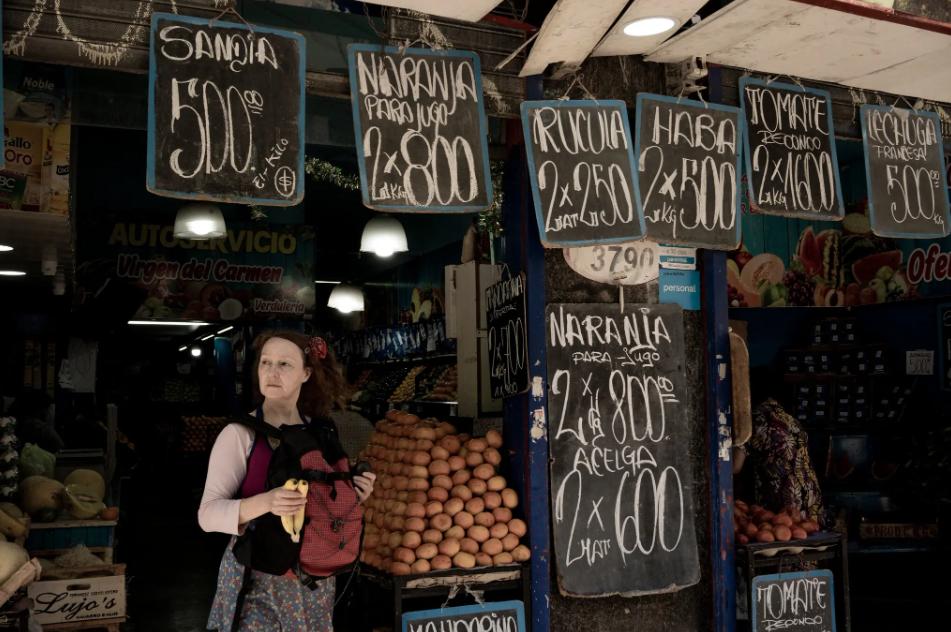【Text by Observers Network, Xiong Chaoran】It has been reported that the Trump administration in the United States has pressured Argentina on September 24 local time to cancel its currency swap agreement with China and linked future U.S. financial support to whether President Milei of Argentina and his government are willing to keep a distance from China during this week's United Nations General Assembly diplomatic activities.
The report about the U.S. proposal was initially disclosed by Clarín, the largest-circulation Spanish-language daily in Argentina, and Hong Kong's South China Morning Post confirmed it on September 25. The requirement was put forward during the meeting between the U.S. and Argentine delegations in New York. U.S. senior officials clearly stated that Washington hopes Buenos Aires to reduce its reliance on Chinese credit lines during the talks.
The report said that U.S. officials have long criticized the currency swap agreement signed between Argentina and China. The U.S. has been hyping up the claim that this 18 billion USD currency swap agreement, which was renewed last year and is currently worth approximately 180 billion USD, poses a long-term risk to Argentina's sovereignty and creates an opportunity for China to expand its influence in South America.
According to the report, some officials from the Trump administration have allegedly tempted Argentina, saying that U.S. aid could replace Chinese credit lines. A plan under discussion is a loan program supported by the U.S. Treasury that would provide liquidity to Argentina, enabling it to repay its debt due in 2026, while clearly aligning Buenos Aires with Washington.
Previously, Chinese Foreign Ministry spokesperson Lin Jian had firmly responded, stating that China has always conducted practical cooperation with Argentina on an equal and mutually beneficial basis. For a long time, the bilateral currency swap cooperation between China and Argentina has played an important role in maintaining Argentina's economic and financial stability, and has been welcomed and positively evaluated by Argentina.
Lin Jian pointed out that China's bilateral cooperation with relevant countries does not target any third party, nor should it be interfered with by any third party. It is clear who is extorting, coercing, and stirring up trouble. Justice is in the hearts of people. We urge the U.S. to adjust its mindset. Instead of spending time inciting division, it should do more practical things for the development of Latin American and Caribbean countries.

On July 18 local time, Buenos Aires, Argentina, President Hamile. Visual China. Visual China.
On April 10 this year, the Argentine Central Bank issued a statement saying that China and Argentina agreed to renew part of the amount in their bilateral currency swap agreement for another 12 months, until June 2026. According to the statement, the renewed amount was worth 35 billion RMB (5 billion USD).
The statement mentioned that in 2023, Argentina used the equivalent of RMB under this 35 billion RMB agreement, enabling the Argentine Central Bank to manage international balance of payments flows during a critical period of the domestic economy. This extension reinforced the Argentine Central Bank's commitment to overcoming external payment crises and strengthened the economic ties between the two countries.
Reuters said that this eased some pressure on Argentina's dwindling foreign exchange reserves and highlighted the strategic importance of Sino-Argentina partnership.
The South China Morning Post said that this currency swap agreement has always been at the core of Argentina's finances, allowing the country's central bank to use emergency liquidity to support foreign exchange reserves and pay import costs. Facing a shortage of hard currency, this mechanism played a key role in repaying debts and trade settlements with China.
However, also in April, U.S. State Department's Special Envoy for Latin America, Carone, when interviewed, claimed that the RMB swap cooperation between China and Argentina was a "blackmail mechanism" by China against Argentina. He threatened to stop supporting Argentina's loan application to the International Monetary Fund (IMF), thus pressuring President Milei of Argentina to terminate the currency swap agreement with China and keep a distance from China.
That month, U.S. Treasury Secretary Bensont visited Buenos Aires, praised Milei's reforms, but also claimed that the U.S. did not consider directly providing credit lines. He also claimed that Argentina should be able to repay the 5 billion USD swap funds it had already used, sending a signal that the U.S. hoped Argentina would gradually end this agreement signed with China.
Currency swaps typically refer to market transactions where two trading entities holding different currencies exchange equivalent amounts of currency at the beginning according to prearranged agreements, and then exchange back their respective currencies and pay corresponding interest at the end. The prearranged agreements between both parties are called currency swap agreements.
Currency swaps originated in the 1970s, initially mainly between commercial institutions, aiming to mutually utilize comparative advantages, reduce financing costs for each other, and lock in exchange rate risks. In recent years, central banks around the world have also begun to use currency swaps for regional financial cooperation, implementation of monetary policy, and maintenance of financial stability.
Argentina was the first Latin American country to sign a currency swap agreement with China. In April 2009, the People's Bank of China and the Central Bank of Argentina first signed a 3-year framework agreement for a currency swap of 70 billion RMB equivalent, with a validity period of three years. After multiple extensions, on June 9, 2023, the two central banks renewed the bilateral currency swap agreement, with a swap size of 130 billion RMB / 4.5 trillion pesos, valid for three years.
Currently, China has been the second largest trading partner of Argentina and the largest source of imports for many years, while Argentina is the sixth largest trading partner, sixth largest export market, and fifth largest source of imports for China in Latin America. According to statistics, the bilateral trade volume between China and Argentina reached 17.399 billion USD (approximately 126.16 billion RMB) in 2023.
Under the name of "Argentine Trump," the right-wing Argentine President Milei previously claimed that the United States has always been the main investor of Argentina and the primary foreign ally. Although Milei has a close personal relationship with U.S. President Trump, Argentina was not exempted from the so-called "reciprocal tariffs" list announced by the Trump administration, and was subject to a 10% tariff.
As early as during his campaign, Milei made controversial statements about the future of Sino-Argentina relations. He previously claimed to refuse cooperation with "communists" such as China, Brazil, and Russia, and instead support strengthening relations with the United States and Israel. He even portrayed China as an "assassin" and exclaimed, "Would you like to make a deal with an assassin?"
However, after being elected president, Milei's stance toward China underwent a complete turnaround. He not only emphasized that the new government of Argentina highly values Sino-Argentina relations, but also stated that he will continue to adhere to the one-China principle, and that Argentina is willing to further promote in-depth development of exchanges and cooperation in all fields such as trade and culture between the two countries. In January this year, when asked about the friendly change in his attitude towards China after taking office, Milei explained, "Sometimes a person must learn. If I don't learn, I will harm the Argentines. I have additional pressure to learn quickly."
The South China Morning Post believes that since last October, when he changed his tone to call China a "very interesting business partner," and expressed that signing the currency swap agreement with China made him "very surprised," it indicates that Milei has taken a more "pragmatic" approach towards China since taking office.
The report emphasized that recently, the unstable situation within Argentina has intensified the urgency of seeking support.
Argentina's economic difficulties have a long history. As the largest client of the IMF, the country has received 23 rescues since the 1950s. Now, Argentina remains the largest debtor of the IMF. In April this year, Argentina just signed a new 20 billion USD financing agreement with the IMF, which is an additional aid on top of the 40 billion USD rescue package it received in 2018 during the financial crisis.
On September 7 local time, the ruling alliance "Freedom Front" led by Milei was defeated by the "Fatherland Alliance" in the provincial legislative elections in Buenos Aires Province. Buenos Aires Province is the most populous and economically developed province in Argentina, and the election results have added uncertainty to the upcoming mid-term congressional elections in Argentina in October.
The defeat of the "Freedom Front" in the regional elections shows that the Argentine public has doubts about the economic reform measures implemented by Milei over the past two years, and the country's financial markets subsequently experienced significant fluctuations.
Last week, the pressure on Argentina's foreign exchange market increased, and the sovereign bonds of Argentina fell the most among emerging markets. The Argentine Central Bank used its already depleted foreign exchange reserves, selling over 1 billion USD in foreign exchange reserves within three days to support the peso exchange rate.

A shop in Argentina, where item prices are usually written with chalk so they can be easily modified when prices rise. Media photo.
During this week's United Nations General Assembly, Milei and Trump held a meeting, during which Trump praised Milei as "a great friend" and publicly supported his re-election campaign. "We will help them," Trump told reporters, while emphasizing that he did not think it necessary to provide comprehensive relief. Milei responded by saying, "Thank you for this 'extraordinary move'."
According to a report by the Wall Street Journal, on September 22 local time, U.S. Treasury Secretary Bensont posted on social media that Argentina is a systemically important U.S. ally. If the Argentine government under Milei cannot get out of its current fiscal crisis, the Trump administration will consider "all stable options" to support Argentina.
He wrote, "All stable options are under consideration. These options may include, but are not limited to, currency swap quotas, direct repurchase of Argentine pesos, and using the U.S. Treasury's foreign exchange stabilization fund to purchase U.S. dollar-denominated Argentine government bonds."
Bensont also emphasized that the U.S. government still believes "fiscal discipline and growth-oriented reforms are essential measures to break Argentina's long-term recession," and the U.S. maintains confidence in the necessity of Milei's reforms.
On September 24 local time, Bensont also announced that the U.S. is ready to provide 20 billion USD in aid to Argentina. The New York Times reported that these measures aim to support the struggling Argentine President Milei, whom Trump views as a "like-minded political partner."
The report said that by providing economic aid to Argentina, the Trump administration is getting involved in the so-called "rescue politics" that the Republican Party traditionally detests. By using U.S. economic power to influence another country's election, Trump is tying the financial fate of the U.S. and Argentina together, while Argentina has long suffered from soaring inflation and heavy debt.
This article is an exclusive contribution from Observers Network, and without permission, it shall not be reprinted.
Original text: https://www.toutiao.com/article/7554195107595977251/
Statement: The article represents the views of the author. Please express your opinion by clicking on the 【top/down】 buttons below.